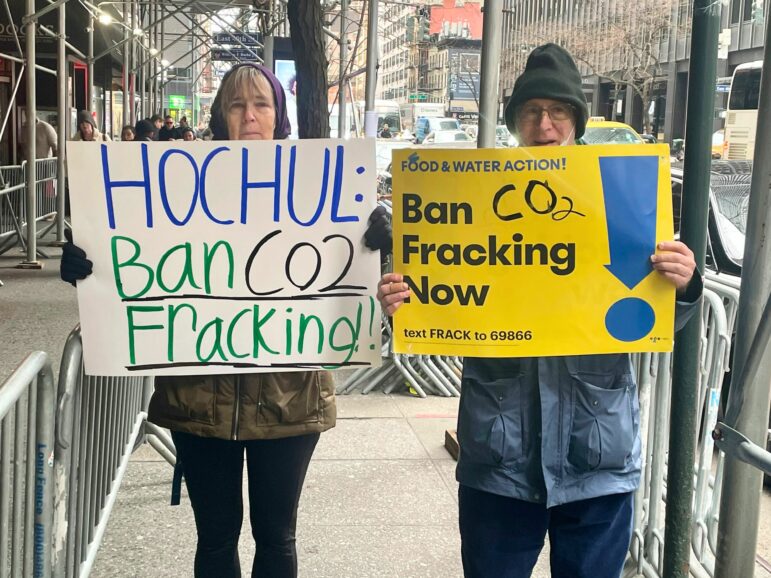A company launched last year is introducing a new fracking technique that uses carbon dioxide (CO2) instead of water to extract gas from underground—and it hopes to do business in New York. But environmental advocates see the plans as an attempt to circumvent the state’s prohibition on fracking.

Mariana Simões
Protestors hold signs outside Gov. Kathy Hochul’s office calling for CO2 fracking to be included in the state’s ban.“Ban fracking now!” A group of a dozen advocates chanted Thursday in front of a skyscraper in midtown Manhattan where Gov. Kathy Hochul keeps an office.
To many in the environmental community, the chant sounded familiar.
“We already banned fracking nearly 10 years ago. We held countless rallies in front of the governor’s office in Manhattan in the past where I led the same chant,” explained Eric Weltman, a senior organizer at Food & Water Watch, one of the main organizations that pushed for the fracking ban. “It’s frustrating, because we need to make progress, and not re-fight all battles.”
In 2014, New York became the first state in the country with known gas reserves to prohibit the extraction of natural gas using a technique known as hydraulic fracturing, or fracking, after a state-wide health investigation concluded it releases toxic pollutants into the air and drinking water.
Then-Gov. Andrew Cuomo first put the ban in effect through executive order. In 2021, the New York State legislature permanently banned fracking in its Fiscal Year 2021 Budget.
But a company launched last year called Southern Tier Solutions is introducing a new fracking technique that uses carbon dioxide (CO2) instead of water to extract gas from underground—and it hopes to do business in New York. Environmental advocates see the company’s plans as an attempt to circumvent the state’s prohibition.
“I’m concerned about this attempt to get around the fracking ban and I think it has to be stopped,” said Marian Swerdlow, a 74-year-old retired high school teacher from the Upper West Side who joined protestors at the rally Thursday. “The fracking ban needs to be protected.”
Southern Tier Solutions, which did not immediately respond to City Limits’ request for comment, says on its website that it is putting out “an immediate and tangible proposition to tap” into deep natural gas reserves running under parts of New York known as the Marcellus and Utica shales.
Families who have land on top of such reserves are usually asked to lease their property to fracking companies, which then drill deep underground to extract gas. Supporters of the practice have promoted it as a source of potential income for financially depressed communities in New York.
Southern Tier Solutions claims to be in the beginning stages of reaching out to landowners about leasing their land for a “series of pilot wells across the Southern Tier.”
The state’s Department of Environmental Conservation (DEC) said in an email that it has “not participated in any pre-application meetings nor received permit applications from Southern Tier CO2 to Clean Energy Solutions.”
The agency said it lacks “sufficient information about this conceptual project” to “speculate” about “the potential State permits or authorizations that would be required” to move it forward.
But advocates remain unnerved by the project.
“This is the first significant threat to the fracking ban we have seen,” said Zephyr Teachout, a law professor known for her anti-fracking stance who ran for governor in 2014, but lost to Cuomo. “The idea that we would now allow fracking seems like it’s absolutely going in the wrong direction.”
Protestors at the rally and over 90 environmental groups are urging lawmakers to introduce legislation that will stop Southern Tier Solutions from moving forward with its still-early proposal, by banning the practice of fracking with carbon dioxide altogether.
The health risks associated with fracking are well documented and known. The process, which requires drilling down into the earth and injecting large amounts of water, sand and chemicals into rock formations, also releases a series of toxic pollutants into the air and water supply.
“As soon as the drill hits the shell, methane will start flowing out of the hole, and along with it benzene and formaldehyde, which can cause cancer, and other radioactive particles,” said Dr. Sandra Steingraber, an activist and biologist who battled cancer and has been studying the health risks of fracking for a decade.
Methane is a powerful pollutant that is a major contributor to greenhouse gas emissions, trapping about 86 times more heat in the atmosphere than carbon dioxide, according to Food & Water Watch.
“CO2 adds new problems that fracking with water doesn’t have. Water is at least a non-toxic substance. But liquefied CO2 is terribly toxic to human life,” Steingraber told City Limits.
“My mom died yesterday morning, and this is the first day of my life walking around on the earth without my mother in it,” Steingraber shared with protesters at the rally Thursday. “And I can’t think of a place I’d rather be right now than here with all of you as we fight for the future of our own children, and as we fight for the future of life itself on this planet.”
To reach the reporter behind this story, contact Mariana@citylimits.org. To reach the editor, contact Jeanmarie@citylimits.org









5 thoughts on “New York’s Fracking Ban Threatened by CO2 ‘Loophole,’ Environmentalists Say”
It’s bad if they continue to destroy our living environment…
There is a grammatical error in paragraph ten where there is an accidental double-space where one is unneeded. This can be seen at “-reaching out to landowners about-“
It is not good for our environment.
Environment protection is necessary for all of us.
Unfortunately, the practice has been going on for years now. It creates vast amounts of wastewater, emits greenhouse gases such as methane, releases toxic air pollutants and generates noise.